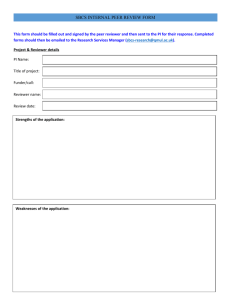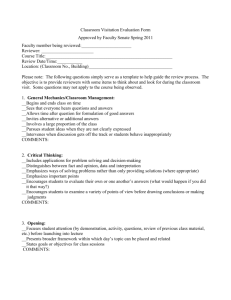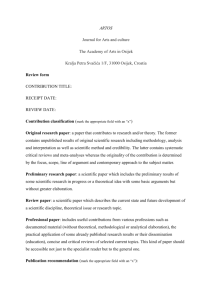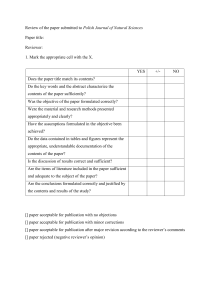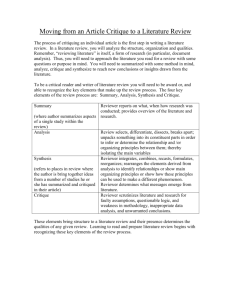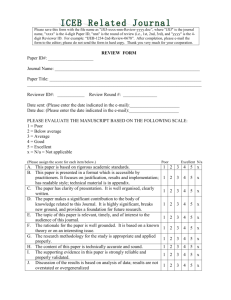hub_DBFM_KSR2_ - Scottish Futures Trust
advertisement
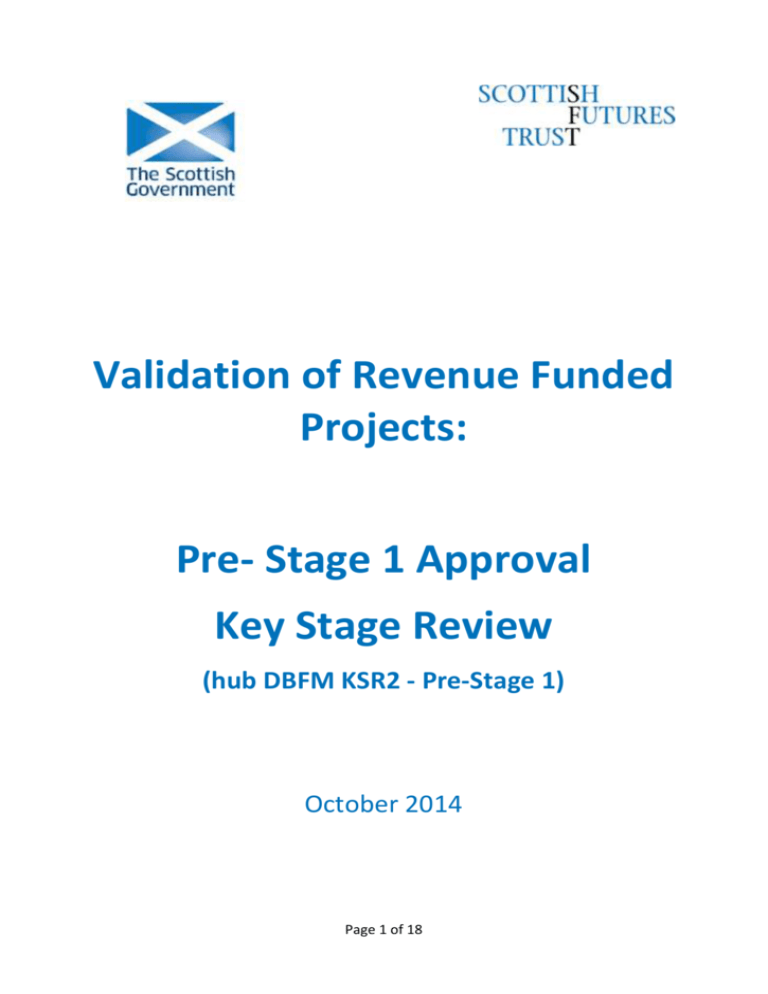
Validation of Revenue Funded Projects: Pre- Stage 1 Approval Key Stage Review (hub DBFM KSR2 - Pre-Stage 1) October 2014 Page 1 of 18 Revenue Funded Projects Pre-Stage 1 Key Stage Review CONTENTS Notes to the Reviewer ................................................................................................................ 3 1.1. Background ................................................................................................................. 3 1.2. Timing ......................................................................................................................... 3 1.3. Process ......................................................................................................................... 3 1.4. Further information ..................................................................................................... 4 1.5. Post review .................................................................................................................. 4 Section 1: Project Outline .......................................................................................................... 5 Section 2: KSR Update .............................................................................................................. 6 Section 3: Project Requirements ................................................................................................ 7 Section 4: Readiness ................................................................................................................ 10 Section 5: Affordability ........................................................................................................... 11 Section 6: Value for Money ..................................................................................................... 14 Section 7: Commercial ............................................................................................................. 15 Section 8: Compliance ............................................................................................................. 16 Scottish Government (SG) Project Sponsor E.g. SGHD, SFC, TS Procuring Authority E.g. LA, College, Health Board Project Team Page 2 of 18 Notes to the Reviewer 1.1. Background It is a condition of Scottish Government (SG) funding support that all projects in the revenue funded programme are, in addition to any existing project approvals processes, externally validated by SFT. SFT undertakes validation by carrying out Key Stage Reviews (KSRs) of projects at key stages of procurement. The KSR process is designed to support the successful delivery of revenue funded projects whether delivered through the non-profit distributing (NPD) model or the hub initiative as Design Build Finance and Maintain (DBFM) projects by providing a stand-back assessment of the readiness of a project before it moves on to the next stage in the procurement process. 1.2. Timing This review is required to be completed in advance of the Stage 1 submission being submitted for approval by the Procuring Authority. The review should be carried out by the member of the Scottish Futures Trust team who normally provides support to the relevant project (the Reviewer). The Reviewer must agree the precise timing of the review and submission of SFT’s report with the Project Sponsor and/or SG to integrate with the other project approvals processes. In the run up to each review point, the Reviewer will inform and keep up-to-date the SFT validation team of the estimated timetable for carrying out the KSR. The validation team will arrange for a member of the SFT’s senior management team (SMT) to scrutinise the list completed by the Reviewer before it can be submitted to the Project Sponsor and/or SG. The Reviewer should thereafter liaise directly with the allocated SMT member and must return a countersigned copy of the list to the Validation Team upon SMT sign-off. The Reviewer should discuss arrangements with the allocated SMT member and provide a verbal briefing if requested in advance of review so that if required necessary background information can be made available. 1.3. Process The Reviewer must familiarise him/herself of the requirements of the checklist and consider which elements s/he can answer on the basis of existing knowledge of the project and identify what additional information is required in relation to the project in order to complete the remaining sections. The Reviewer should, at the earliest opportunity, explain to the Procuring Authority / Project Team what additional information s/he will require, in what form and by when in order to complete the review within the agreed timescales. The review is not intended to be a “stop-start” process and the Reviewer should refer to the list throughout each delivery stage so that all sections of the checklist can be completed without delay to the project. The process involves the Reviewer completing this pro-forma list on the basis of information obtained in his/her day-to-day dealings with the project, considering whether in his or her view the project is ready to proceed to the next stage of procurement and making recommendations as to what actions may be required to achieve appropriate state of readiness. No formal submission, as such, will be required from the Page 3 of 18 Procuring Authority, but the project team will be required to provide the Reviewer with information to allow him/her to complete the list and compile his/her report. Once completed by the Reviewer, the list and draft report should be submitted to the allocated SMT member for scrutiny. The Reviewer in consultation with the SMT member must agree what follow-up will be required to any recommendations made, in what form and in what timescales before being issued to the relevant Project Sponsor and/or SG and copied to the Procuring Authority. The relevant Project Sponsor and/or SG will thereafter, as part of its overall sign-off process, determine whether and on what basis the project should proceed to the next stage taking into consideration any recommendations made in the KSR report. The Reviewer should liaise directly with the Project Sponsor and Procuring Authority as may be required to address any queries arising from the KSR report or recommendations. 1.4. Further information Please contact the Validation Team for further information on the KSR process. Queries relating to the revenue funded programme requirements should be directed to the SFT Finance Team. 1.5. Post review Once the review document has been agreed with the Procuring Authority a copy of the final document (preferably in Word -format) must be submitted to SFT validation team together with an estimate of timing of the next review. The Reviewer is responsible for updating the SMT member with progress made in accordance with the agreed follow-up plan. Page 4 of 18 Section 1: Project Outline Project title Brief project description Outline of scope of services in project (please identify services and who will provide those services) Planned Stage 1 Approval Date Project Timetable Project Contact Details Project Sponsor /SG Responsible Officer (name & contact details) Project Authority Responsible Officer (name & contact details) Project Director/Manager (name & contact details) Principal legal, technical and financial advisers (firm/company & name of main contact) Page 5 of 18 Section 2: KSR Update A) Please provide an update in respect of any outstanding Pre-NPR KSR recommendations and provide a reason for delay. Recommended actions: To be completed by: Status: B) If any of the agreed KSR follow-up actions remain outstanding please restate these here and provide reason for delay. SFT follow up actions: Reporting requirement: Page 6 of 18 Status/Update: Section 3: Project Requirements The key objective of this section is to ensure that the proposed solution has been developed in sufficient technical detail, minimising the need for any change in the run-up to financial close and that the Procuring Authorities have considered all retained risks. Question 1. 2. Yes/No Have there been any changes to the scope of the project since the NPR was launched and, if so, what has been their impact on the Stage 1 proposal? - Have these changes been signed off by the Project Sponsor? 3. What is the proposed solution, how has it been evaluated and is the Procuring Authority satisfied that it delivers the project objectives, benefits and outcomes? 4. Is the technical solution deliverable and does it meet expected sustainability standards? Has it been signed off by external advisers to the project? Please briefly describe the Procuring Authority’s position in relation to the following matters and confirm that the Procuring Authority’s approach has been reviewed following the Stage 1 Submission: 5. - the scope, cost and timing of any enabling works that require to be carried out to Page 7 of 18 Comments support the effective construction and operation of the facilities; 6. - the scope and interface between FM services to be included within the project and those for which the Procuring Authority will retain responsibility; 7. - the interface between design and the delivery of FM services (e.g. cleaning) and risks (e.g. energy consumption, security) retained by the authority; 8. - the impact of the project on staff (including potential impact of TUPE legislation); 9. - the delivery of equipment and the Procuring Authority’s IT requirements within the new facilities; 10. - sustainability and delivery of community benefits; 11. - decant from existing facilities, migration to new facilities, disposal of residual assets and termination/variation of any existing contractual arrangements related to the existing facilities; Page 8 of 18 12. - any conditions or recommendations on scope/specification/design identified in the outline business case approval or previous KSRs. 13. Is the clarity over the interface (during both construction and operations) between the works and services within the project and the Procuring Authority’s other facilities and services obligations (e.g. impact on use of adjoining facilities and service delivery during construction phase) and is the Procuring Authority satisfied that the interface issues described above can be resolved in a manner that will satisfy its operational and functional requirements and deliver the project outcomes? Page 9 of 18 Section 4: Readiness The key objective of this section is to ensure that the commercial issues have been sufficiently tied down to ensure that the project is affordable and deliverable. Question 14. Are there any changes to the governance arrangements, project resourcing or budgets that are required for Stage 2? 15. Is there any update on key risks? 16. Yes/No - Have mitigation strategies been adopted? Is a deliverable land and planning strategy in place which includes details of outstanding surveys, acquisition activities and remedial/enabling works? 17. If this is a health hub project resulting in surplus land, does the Procuring Authority have a plan in place to deal with any surplus land receipts? 18. Have statutory and stakeholder consultations been carried out? - Have any significant objections been dealt with? Page 10 of 18 Comments Section 5: Affordability The key objective of this section is to assess the certainty of the stated affordability position of the project, and to highlight any areas that lack certainty. 1) Please complete the following project affordability table below covering the duration of the contract period applicable to your project (25 or 30 years etc) and provide an outline of any key assumptions1: OBC (£m) Construction cost (nominal cumulative) Design fees (nominal cumulative) hub development costs2 (nominal cumulative) Sub-hubCo costs (in construction) (nominal cumulative) Hard FM costs (real per annum) In-house service costs (for services not included in the hubCo contract) Lifecycle costs (real cumulative) Sub-hubCo costs (in operations) (real per annum) Operational Term (years) Percentage of unitary charge indexation Swap rate3 1 It is expected that these costs will be based on internally generated estimates pre-NPR Including success fees 3 Including any buffer 2 Page 11 of 18 NPR Stage1 Stage2 OBC (£m) NPR Unitary charge (nominal year 1 of operations) Unitary Charge (NPV) SG funding support (nominal year 1 of operations) SG Funding Support (NPV) Question Yes/No Comments 19. Please outline reasons for any major cost movements between the proposal and pre-NPR cost estimates together with any key assumptions, exclusions, prime and provisional sums included in the proposal. 20. Is there a plan in place for how the risks associated with cost assumptions will be managed during Stage2? 21. Has a review by the Technical Advisers of the Stage 1 Pricing Report been completed and have matters arising been resolved? 22. Does the Procuring Authority have clarity over all outstanding technical and design issues and have Page 12 of 18 Stage1 Stage2 they evaluated their impact on the deliverability and cost of the project? 23. Have the Stage 1 and forecast Stage 2 affordability positions been formally signed off by SFT, the Procuring Authority and the Project Sponsor? Page 13 of 18 Section 6: Value for Money The key objective of this section is to ensure that the achievability, viability and desirability of the solution and the funding route have been reviewed. Please refer to relevant Value for Money guidance 4. Question Yes/No Comments 24. Please demonstrate how the authority intends to drive value for money through “Effective Delivery”. [Response required only to the extent that the position has changed since Pre-NPR KSR] 25. Have any changes to scope and procurement options since the Pre-NPR KSR been assessed and is there an impact on the delivery of value for money because of these changes? 26. Has the Procuring Authority assessed the requirements for demonstrating VfM in accordance with SFT VFM Guidance? 4 Value for Money Assessment Guidance: Capital Programmes and Projects (updated October 2011) and SFT’s Supplementary Guidance for projects in £2.5bn Revenue Funded Investment Programme (October 2011) Page 14 of 18 Section 7: Commercial The key objective of this section is to ensure that the commercial issues have been sufficiently tied down to ensure that the project is affordable and deliverable. Question Yes/No Comments 27. Has a realistic programme been produced by hubCo (and agreed with their funders) for the various due diligence processes required to reach financial close? 28. What, if any, key commercial issues remain outstanding and how are the implications for the project programme and affordability position to be managed? 29. Please confirm the status of the Procuring Authority’s title investigations, and whether a list of disclosed title conditions, and the impact of these conditions, has been agreed with hubCo. Page 15 of 18 Section 8: Compliance The key objective of this section is to test that the project has considered and adopted procurement best practice and that the project sponsors are aware of any outstanding commercial issues. Question Yes/No Comments 30. Has the Procuring Authority adopted relevant standard documentation? 31. Has the Procuring Authority provided a copy of the schedule of amendments provided as part of the Stage 1 proposals and have all derogations been signed off by SFT? 32. Is the proposal in accordance with the agreed method statements? Page 16 of 18 Is the project ready to proceed to the next stage? Yes.* (*Delete as applicable) Yes , subject to recommendations below* No, due to reasons outlined below.* Reasons / Recommended actions: To be completed by: Signature of Primary Reviewer Signature of Secondary Reviewer Date: Date: Procuring Authority Declaration I confirm that I am not aware of any information that would materially change the assessment and review of the project. Name and Position: Date and Signature: Page 17 of 18 SFT follow up action: Reporting frequency / deadline: Page 18 of 18 Date of completion: Signature of Secondary Reviewer on completion:
